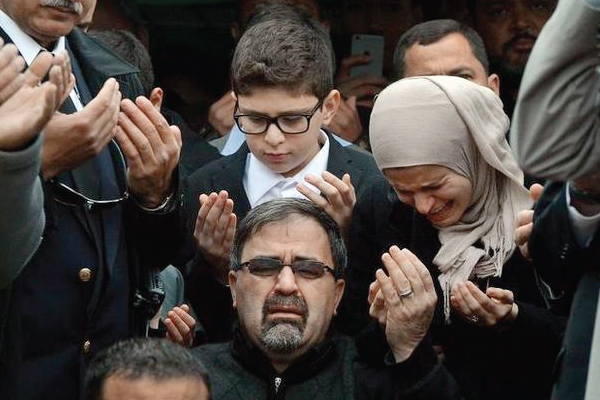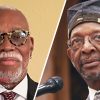|
After Tuesday’s events in Chapel Hill, North Carolina, some are saying that the triple murder of Deah Barakat, Yusor Abu-Salha, and Razan Abu-Salha was just an ordinary neighbor dispute with a horrific outcome. As Craig Hicks’ lawyer told a judge, “Unfortunately these victims were there at the wrong time at the wrong place.” (Someone will have to explain to me how your own home can ever be “the wrong place.”)News outlets tell us that Hicks is an “angry man,” that he was known as an “equal opportunity offender.” They tell us these victims just happened to be Muslim. They tell us they could have been anything. They tell us it was about parking.
If you believe these three victims were killed over a parking spot, then you probably still bake cookies for Santa Claus. Well, we Muslim and Arab Americans see things a little differently. And maybe it’s because we live in a different world. We’ve been saying that anti-Arab and anti-Muslim bigotry has reached dangerous levels. We have been trying to get you understand that asking us to constantly condemn, to constantly prove that we belong, and to constantly make you feel comfortable with our existence only serves to maintain the idea that we are lesser than you. We have been begging you to end the dehumanization and demonization of our people. We have been asking you to stop. But you didn’t stop. Instead, the most popular American movie glorifies the killing of Arabs. One of the most popular video games is predicated on the objective of shooting as many Muslims as possible. We are the enemy. We are the threat. I wonder if those who watch ‘American Sniper’ realize that the “targets” in that movie look a lot like the masses who have held silent vigils around the nation this week. I wonder if those who play ‘Call of Duty’ realize that the “enemies” in that game look just like the sea of people grieving at Thursday’s funeral in North Carolina. A couple of weeks ago, I wrote about what I thought was a misguided review of ‘American Sniper’ by Arab-American comedian, writer, and commentator Dean Obeidallah. My main critique (Dean called the movie “the most powerful anti-war film I have ever seen”) was that his conclusion that Eastwood didn’t intentionally set out to dehumanize Arabs ignored a context of latent anti-Arab and anti-Muslim racism in our society. Generations of filmmakers, television producers, and media professionals have made it their stock and trade to depict Arabs and Muslims without nuance, layers, or humanity. Dean seemed to see the movie as a single event and not as yet another result of this sustained enterprise. This media venture leads to a societal atmosphere where Arab and Muslim Americans are regarded in an especially perilous manner. We are not simply seen as “different.” “Different” would be fine. We can handle “different.” Instead, we are “othered” in a way that paints us as foreign, threatening, and unworthy of protection. Our existence is many times seen as incompatible with the American way. There are different kinds of discrimination, and this is the kind we face. It is, as we are now seeing, dangerous. As investigators look into Craig Hicks in order to determine whether or not he committed a hate crime, they might find that he didn’t “specifically” hate Muslims (It should be noted here that a hate crime classification simply requires that the perpetrators actions were driven “in whole or in part” by bias). But even if law enforcement finds as much, why do we Arabs and Muslims believe this was a hate crime nonetheless? Why do we believe that this would not have happened if his neighbors had been 3 young white Christians? It is because we believe Hicks had already dehumanized Deah, Yusor, and Razan, to the point where their lives had no value. It didn’t matter whether they were models of humanity (which by all accounts they were) or just average reality show-watching Americans. To him, by virtue of their particular faith, they were caricatures. In Hicks’s eyes, they were just simplified portraits of the “enemy,” the same enemy Chris Kyle saw through the scope of his rifle. The constant contempt for our humanity in television shows, video games, and films meant to “entertain” American society is the ancestor of events like the brutal murders of three Muslim students in Chapel Hill, the physical assault of an Muslim father in Dearborn, the harassment of a Muslim mother on an airplane, the apparent arson of an Islamic center in Houston, and the hit-and-run killing of a Muslim teenager in Kansas. It is why the American media took a “wait-and-see” attitude before fully reporting on Deah, Yusor, and Razan. It is also why that same media started reporting on today’s shooting in Copenhagen within minutes, hitting us hard with witness accounts, experts, and commentary. I will also note the police beating earlier this week of an Indian grandfather in Alabama resulting in his paralysis. When Arabs and Muslims are despicably rendered without any specificity, other communities who might be “mistaken” for them become victims as well. We recently saw it in Alabama, and we have seen it before in numerous instances like the murder of six Indian Sikhs at a temple in Wisconsin in August 2012. Unsurprisingly, when racists decide to violently attack, they don’t conduct too much research into their victims. Any sighting of veils, turbans, brownish skin, or beards is usually enough. All of this is precisely why excusing any instances of the dehumanization of Arabs and Muslims in the media, no matter how small, is wholly unacceptable. Sometimes we hear and say things like, “It’s not a big deal,” or “It’s only a movie,” or “No one would ever do anything like that.” Well, it is a big deal, it’s not just a movie, and some people are doing stuff like that. To anyone who would absolve, tolerate, or discharge Clint Eastwood and ‘American Sniper’ a couple weeks ago, my question is this: Would you do it again today? The constant negative and unchecked imagery and rhetoric targeted against Arabs and Muslims is something we all live with in everyday ordinary life. It is not exceptional. It is commonplace. Telling us that the violence that occurs against us is not about who we are and how we look is like telling the families of Michael Brown, Eric Garner, and Tamir Rice the same thing. It is demeaning, it ignores our experience, and it denies our reality. The dehumanization of Arabs and Muslims in America is not a figment of our imagination. The media brutality that we bear is real. The criminal who murdered Deah, Yusor, and Razan will be roundly condemned, but that is not the point. We are devastated. We are saddened. We are crying out in pain. But we are not surprised. And that, sadly, is the point. |















